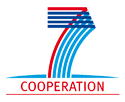

ICT-2009-247473
SmartCoDe facilitates transition toward renewable energy
Published: Mon, 2012/05/07
Found at: Pressebox
Contact Person:
Video clip demonstrates how private households and small businesses benefit
(PresseBox) Hannover, 07.05.2012,
The edacentrum, an Institution advancing research and development in the area of Electronic Design Automation, has produced an informative video clip demonstrating SmartCoDe’s mode of operation. The English language demonstration explains comprehensibly how SmartCoDe incorporates the local generation of renewable energies and makes predictions for energy management. The energy management balances the local power consumption which releases the grid of local peak loads.
One of today’s main challenges is carbon dioxide reduction. Up to 40% of Europe’s total energy consumption stem from smaller buildings and groups of buildings. The SmartCoDe project positions itself between private consumers and local power generation. It focuses on the reduction of this energy usage by means of information and communication technology (ICT). SmartCoDe enables communication on a global level: The local energy management acts as an interface to the global grid and can adapt its behaviour to the grid’s requirements. The prerequisite is the approval of the end customer and the availability of control information from the energy supplier..
“This insightful video clip is supposed to raise awareness of this trend-setting technology. We are convinced that it is necessary to make energy management available to private households as well, and this is the goal of the EU project SmartCoDe”, affirms Wolfgang Rosenstiel, chairman of the edacentrum. Intelligent energy management is supposed to help controlling various energy consuming devices in private households and to integrate local renewable electricity provider.
At the heart of SmartCoDe is a highly integrated chip which can be integrated as a compact module in as many different household devices as possible. This allows not only for acquisition of end user data but also for intelligent action, controlled by a central energy management system. The chip is a System-in-Package module (SiP), developed as a prototype by Infineon Technologies and the project partners within the SmartCoDe network.
Saving Power with ICT
At CeBIT 2012 in Hannover, edacentrum demonstrated the technological premises for the change-over to renewable energy sources within the framework of the research project SmartCoDe at the joint booth of the European Commission. The central issue was the importance of microelectronics for the area of renewable energy sources and its relevance for the change-over towards such energy sources. Until the end of this year the eight project partners intend to provide the proof-of-concept with a SmartCoDe demonstrator. The results of the project SmartCoDe are going to facilitate energy management in buildings and neighbourhoods at very low additional non-recurring costs.
Ms Neelie Kroes, vice president of the European commission visited the booth in the course of her tour of CeBIT in order to receive first-hand information on SmartCoDe. Ms Kroes was shown a live demonstration of the SmartCoDe project which brings intelligent energy management to consumers and co-ordinates power-using appliances with a special focus on security and privacy. The proposed concept enables significant power savings. The EU commissioner was especially interested in the SiP chip module which demonstrated ostensively the significance of microelectronics as a key enabling technology for solving the problems of the 21st century.
As of now, the video clip is available on the project website (https://www.fp7-smartcode.eu) and on YouTube (http://youtu.be/rN0HvT-bgQ4).
About SmartCoDe
The project SmartCoDe is being funded within the European Commissions’ 7th Framework Program (FP7). Its major aim is balancing and reducing the power usage of small buildings and neighbourhoods in order to pave the way for energetically neutral or even energetically positive local power grids. This STREP project (Specific Targeted Research Project) is planned for a duration of three years and started in January 2010. It receives funding from the programme “ICT-2009” in the area “ICT support to energy-positive buildings and neighbourhoods”. In total, there are eight partners from five European countries working together.
About edacentrum
edacentrum is an institution dedicated to promote electronic design automation (EDA) research and development funded by the BMBF (Federal Ministry of Education and Research). It initiates, evaluates and supervises industry-driven R&D projects and offers a comprehensive spectrum of services on all matters concerning EDA, particularly project management of R&D projects. By encouraging EDA cluster research projects and EDA networks, it cross-leverages and reinforces the EDA expertise of universities and research institutes.
edacentrum provides a communication platform for the EDA community; it seeks to inform upper management, the public and the political arena about the central importance of design automation for solving complex system and semiconductor problems, especially those associated with nanoelectronics.
